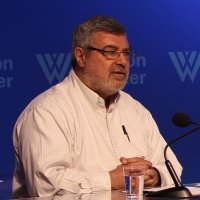The Annual Michael Van Dusen Lecture on the Middle East: "ISIS is About the Arab Past, Not the Future"
Rami Khouri, former Public Policy Scholar, Woodrow Wilson Center, discussed the reasons why ISIS is a result of the political and socio-economic issues in the Arab world during the past 75 years.
On May 11, 2015, the Middle East Program at the Woodrow Wilson Center hosted the second Michael Van Dusen Lecture on the Middle East with Rami Khouri, “ISIS is About the Arab Past, Not the Future.” Rami Khouri is a former Director and now a Senior Public Policy Fellow at the Issam Fares Institute for Public Policy and International Affairs, American University of Beirut. He is a syndicated columnist for The Daily Star in Beirut, Lebanon. Haleh Esfandiari, Director of the Middle East Program, Woodrow Wilson Center, moderated the event.
Khouri emphasized the importance of analyzing the past to understand the success and the rise of ISIS. He argued that ISIS is a response to the myriad of issues in the Arab world, which can be categorized into three main factors: harsh Arab domestic state rule in individual states, foreign military intervention, and the enduring Arab-Israeli conflict. His remarks focused primarily on the first two issues.
Khouri characterized many of the Arab states as having low to no democratic participation, military oversight, or budgetary oversight. These issues, exacerbated by governments’ reliance on their security apparatuses, little accountability to citizens, and few opportunities for education, prevented many Arabs from participating in their countries as engaged, involved citizens. Khouri said that the Arab uprisings were a reaction to these underlying problems—people wanted dignity, social justice, and jobs. When these needs were not met, people had few options to improve their lives, and groups like ISIS initially became appealing because they disrupted the status quo.
He also cited U.S. military presence in the region, including the 2003 invasion of Iraq, and general global support for autocratic Arab regimes as other historical issues that led to the creation of ISIS. The invasion of Iraq, for example, created enough chaos and instability that ISIS found an opportunity in which to grow, and autocratic governments’ overuse of jails to silence dissenters provided many ISIS leaders a space to radicalize and form networks. He argued that foreign military intervention and support for autocrats cannot be used to defeat ISIS—they helped to create ISIS in the first place.
Khouri also discussed the other dimensions that led to the rise of ISIS in the Arab world. He stated that only a few people support ISIS because of their religious beliefs. He pointed to issues such as sectarianism, the need for an identity, the appeal of ISIS’s social norms, the desire to live under stronger governance, and the ability to provide basic human needs such as order and justice as other reasons that individuals join ISIS.
Believing that ISIS can easily be defeated by Arab, Iranian, and Kurdish forces, Khouri said that once ISIS is defeated, the underlying issues that led to ISIS in the first place will remain. This could, in turn, lead to the formation of a group much worse than ISIS. He argued that these underlying issues must be solved in order to prevent another dangerous movement from forming.
In the question and answer portion of the event, Khouri responded to a question on short-term policy recommendations to combat radical groups. He answered that Western attempts to bring democracy to the Middle East were unsuccessful and that there needs to be support for local groups working in the Arab world that are bringing positive, democratic change. He said change must come from within—external forces such as Western militaries will only bring more chaos. Esfandiari asked what sort of appeal ISIS has when it commits atrocities, which is the opposite of the stability and human rights that people are looking for. Khouri answered that Arabs may not necessarily support ISIS’s message or methods, but they have become disillusioned with past governments and global forces and hope that ISIS will able to look out for their interests.
By: Padideh Jalali, Middle East Program
Speaker

Distinguished Public Policy Fellow at the American University of Beirut, Arab Center Washington Senior Fellow; Al Jazeera columnist; Author
Hosted By

Middle East Program
The Wilson Center’s Middle East Program serves as a crucial resource for the policymaking community and beyond, providing analyses and research that helps inform US foreign policymaking, stimulates public debate, and expands knowledge about issues in the wider Middle East and North Africa (MENA) region. Read more
